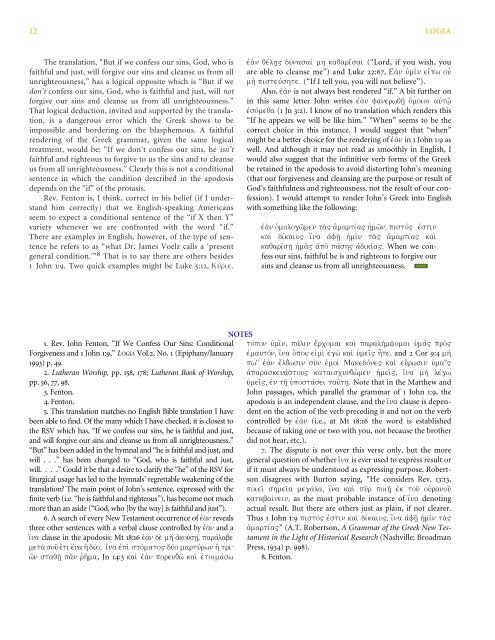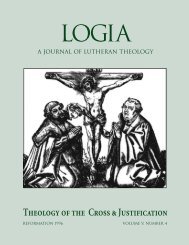03-1 Pastoral Care.pdf
03-1 Pastoral Care.pdf
03-1 Pastoral Care.pdf
- No tags were found...
Create successful ePaper yourself
Turn your PDF publications into a flip-book with our unique Google optimized e-Paper software.
12 LOGIAThe translation, “But if we confess our sins, God, who isfaithful and just, will forgive our sins and cleanse us from allunrighteousness,” has a logical opposite which is “But if wedon’t confess our sins, God, who is faithful and just, will notforgive our sins and cleanse us from all unrighteousness.”That logical deduction, invited and supported by the translation,is a dangerous error which the Greek shows to beimpossible and bordering on the blasphemous. A faithfulrendering of the Greek grammar, given the same logicaltreatment, would be: “If we don’t confess our sins, he isn’tfaithful and righteous to forgive to us the sins and to cleanseus from all unrighteousness.” Clearly this is not a conditionalsentence in which the condition described in the apodosisdepends on the “if” of the protasis.Rev. Fenton is, I think, correct in his belief (if I understandhim correctly) that we English-speaking Americansseem to expect a conditional sentence of the “if X then Y”variety whenever we are confronted with the word “if.”There are examples in English, however, of the type of sentencehe refers to as “what Dr. James Voelz calls a ‘presentgeneral condition.’” 8 That is to say there are others besides1 John 1:9. Two quick examples might be Luke 5:12, Kuvrie,eja;n qevlh/" duvnasaiv mh kaqarivvsai (“Lord, if you wish, youare able to cleanse me”) and Luke 22:67, Eja;n uJmi'n ei[pw oujmh; pisteuvshte. (“If I tell you, you will not believe”).Also, eja;n is not always best rendered “if.” A bit further onin this same letter John writes eja;n fanerwqh/' o{moioi aujtw/'ejsovmeqa (1 Jn 3:2). I know of no translation which renders this“If he appears we will be like him.” “When” seems to be thecorrect choice in this instance. I would suggest that “when”might be a better choice for the rendering of eja;n in 1 John 1:9 aswell. And although it may not read as smoothly in English, Iwould also suggest that the infinitive verb forms of the Greekbe retained in the apodosis to avoid distorting John’s meaning(that our forgiveness and cleansing are the purpose or result ofGod’s faithfulness and righteousness, not the result of our confession).I would attempt to render John’s Greek into Englishwith something like the following:eja;n oJmologw'men ta;" aJmartiva" hJmw'n, pistov" ejstinkai; divkaio" i{na ajfh/' hJmi'n ta;" aJmartiva" kai;kaqarivsh/ hJma'" ajpo; pavsh" ajdikiva". When we confessour sins, faithful he is and righteous to forgive oursins and cleanse us from all unrighteousness. LOGIA1. Rev. John Fenton, “If We Confess Our Sins: ConditionalForgiveness and 1 John 1:9,” LOGIA Vol.2, No. 1 (Epiphany/January1993) p. 49.2. Lutheran Worship, pp. 158, 178; Lutheran Book of Worship,pp. 56, 77, 98.3. Fenton.4. Fenton.5. This translation matches no English Bible translation I havebeen able to find. Of the many which I have checked, it is closest tothe RSV which has, “If we confess our sins, he is faithful and just,and will forgive our sins and cleanse us from all unrighteousness.”“But” has been added in the hymnal and “he is faithful and just, andwill . . .” has been changed to “God, who is faithful and just,will. . . .” Could it be that a desire to clarify the “he” of the RSV forliturgical usage has led to the hymnals’ regrettable weakening of thetranslation? The main point of John’s sentence, expressed with thefinite verb (i.e. “he is faithful and righteous”), has become not muchmore than an aside (“God, who [by the way] is faithful and just”).6. A search of every New Testament occurrence of eja;n revealsthree other sentences with a verbal clause controlled by eja;n and ai{na clause in the apodosis: Mt 18:16 eja;n de; mh; ajkouvsh/, paravlabemeta; sou' e[ti e{na h] duvo, i[na ejpi; stovmato" duvo martuvrwn h] triw'nstaqh/' pa'n rJh'ma, Jn 14:3 kai; eja;n poreuqJw' kai; ejtoimavswNOTEStovpon uJmi'n, pavlin e[rcomai kai; paralhvmyomai uJma'" pro;"ejmautovn, i{na o{pou eijmi; ejgw; kai; uJmei'" h\te, and 2 Cor 9:4 mhvpw” eja;n e[lqJwsin su;n ejmoi; Makedovne" kai; eu{rwsin uJma’"ajparaskeuavstou" kataiscunqJw'men hJmei'", i{na mh; levgwuJmei'", ejn th/' uJpostavsei tauvth/. Note that in the Matthew andJohn passages, which parallel the grammar of 1 John 1:9, theapodosis is an independent clause, and the i{na clause is dependenton the action of the verb preceding it and not on the verbcontrolled by eja;n (i.e., at Mt 18:16 the word is establishedbecause of taking one or two with you, not because the brotherdid not hear, etc.).7. The dispute is not over this verse only, but the moregeneral question of whether i{na is ever used to express result orif it must always be understood as expressing purpose. Robertsondisagrees with Burton saying, “He considers Rev. 13:13,poiei' shmei'a megavla, i{na kai; pu'r poih/' ejk tou' oujranou'katabaivnein, as the most probable instance of i{na denotingactual result. But there are others just as plain, if not clearer.Thus 1 John 1:9 pistov" ejstin kai; divkaio", i{na ajfh/' hJmi'n ta;"aJmartiva"” (A.T. Robertson, A Grammar of the Greek New Testamentin the Light of Historical Research (Nashville: BroadmanPress, 1934) p. 998).8. Fenton.
















